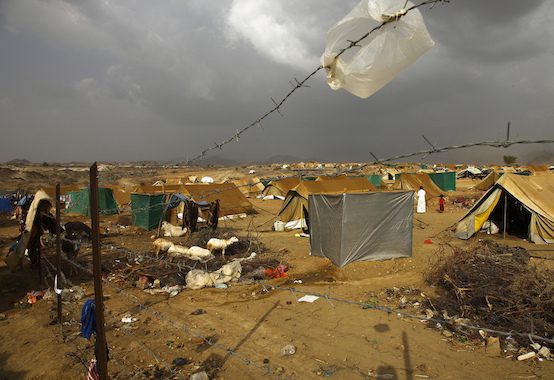Yemen Is Still Being Starved to Death

Food imports into Yemen have reached an all-time low:
NRC secretary general Jan Egeland called the situation in Yemen “a gigantic failure of international diplomacy”.
“Nowhere on earth are as many lives at risk,” said Egeland at a news conference in the Yemeni capital Sanaa.
“We are not even sure that the main humanitarian lifeline through the port of Hodeida will be kept open,” said Egeland.
“This makes Yemen the largest food security crisis in the world.”
Yemen is the world’s worst humanitarian crisis, and tens of millions are at risk of dying from starvation and preventable disease. There has undoubtedly been a failure of international diplomacy and international institutions in this case, but more than that the crisis is the result of the deliberate efforts of many governments, including ours, to batter and starve a poor country into submission. The creation of a major man-made famine in Yemen is not some unforeseen accident. It is mostly the predictable outcome of a series of horrible policy decisions made by coalition governments and their Western supporters.
First, the coalition intervened and escalated an existing conflict so that it became much more destructive and severe than it would have been, then they blockaded the country and greatly exacerbated the country’s food insecurity, and then their bombing campaign has systematically devastated the country’s infrastructure and economy and brought Yemen’s health care system to the point of collapse. All of this was done with the full support and active assistance of the U.S. and Britain. The governments most responsible for this disaster are also the ones with the means to prevent it from getting worse, but until now they have shown little interest in doing so.
All parties to the conflict have shamefully used food as a weapon, but it is the coalition air and sea blockade that has taken such a massive toll on a country that relies heavily on imported food and medicine. It is their bombing campaign that destroyed the cranes at Hodeidah, and that has brought the delivery of what little does come in to a crawl. Hadi’s government further compounded the problem by moving Yemen’s central bank to Aden, which has made it much harder for importers to arrange financing in the first place. The food that does make it into the country is now far too expensive for most people to buy, and distribution of aid is also hindered by the ongoing conflict.
In another report, Egeland is quoted again:
“When people have no income and the prices of food in the market have tripled, hungry people can only afford to look at the food in the market. They cannot afford to buy it,” Egeland said, adding that there were no food stocks left in Yemen [bold mine-DL].
“There are no reserves, there are no warehouses there like in many of the other wars I have visited. Everything goes straight into hungry mouths,” he said.
Yemen is facing massive loss of life from famine and disease unless current trends and policies are quickly reversed. The U.S. can and should withdraw all support for this atrocious war. Beyond that, Washington should also insist on an end to the coalition blockade and press for an immediate cease-fire to allow for the unfettered delivery of humanitarian aid wherever it is needed regardless of which side happens to control the territory. That is the very least that the U.S. can do after two years of disgraceful enabling of this disaster.